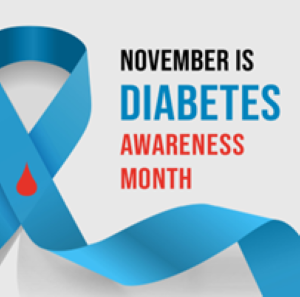The 14th November is World Diabetes Day, while some countries recognise November as Diabetes Month.  For this reason, we are focussing on diabetes throughout November to raise awareness of this condition.
For this reason, we are focussing on diabetes throughout November to raise awareness of this condition.
Throughout November we will share information and resources about: common symptoms, myths and frequently asked questions, and looking at how we may be able to prevent getting Type 2 diabetes. This week will focus on common symptoms.
Diabetes is a chronic condition that affects how the body regulates blood sugar levels. Early detection and management of diabetes are crucial to prevent complications and improve overall health.
According to diabetes.org.uk, it is estimated that more than five million people in the UK are living with diabetes, which is an all-time high. 4.3 million people in the UK live with diabetes and 850,000 people could be living with diabetes who are yet to be diagnosed. These registration figures for 2021-22 are up by 148,591 from 2020-2021.
Diabetes type 1 and type 2 come from different causes.
In Type 1, the pancreas doesn’t make insulin (which controls blood sugar levels) because the body’s immune system attacks the cells that make the insulin. In Type 2, the insulin you make either can’t work effectively, or you can’t produce enough of it.
Risk Factors
The risk factors of type 2 diabetes are multiple and complex. They include:
- Age
- Family history
- Ethnicity
- Being overweight
Research has consistently shown that for some people, combined lifestyle interventions – including diet, physical activity and sustained weight loss – can be effective in reducing the risk of type 2 diabetes by about 50%.
Common Symptoms of Diabetes
The symptoms of diabetes can vary in intensity and may not always be noticeable. However, some of the most common signs include:
- Increased thirst and urination: As the body tries to excrete excess sugar, you may notice a frequent urge to urinate, especially at night.
- Fatigue and weakness: High blood sugar levels can drain your energy, leaving you feeling tired and fatigued.
- Unexplained weight loss: Weight loss without trying can be a sign of diabetes, as the body is unable to use sugar properly for energy.
- Slow-healing wounds: Diabetes can affect blood circulation, making it difficult for wounds to heal properly.
- Blurred vision: High blood sugar levels can damage the nerves in the eyes, leading to blurred vision.
- Genital itching or thrush: Excess sugar can encourage the growth of yeast, causing itching and irritation in the genital area.
- Frequent hunger: Despite eating regularly, you may feel constantly hungry as your body is unable to absorb glucose effectively.
- Skin problems: Diabetes can increase the risk of skin infections, dryness, and rashes.
- Numbness or tingling in the hands or feet: This is known as neuropathy and is caused by nerve damage due to high blood sugar levels.
We have produced a poster highlighting the main symptoms – you can find it the UK News download page: here
Seeking Medical Attention
If you are experiencing any of these symptoms, it is important to consult your doctor for a proper diagnosis and treatment plan. Early detection and management of diabetes can help prevent serious complications such as heart disease, stroke, kidney damage, and vision loss.
Useful Resources
For more information about diabetes, including symptoms, management, and support, please visit the following resources:
- Diabetes UK: https://www.diabetes.org.uk/
- NHS Diabetes https://www.nhs.uk/conditions/diabetes/
